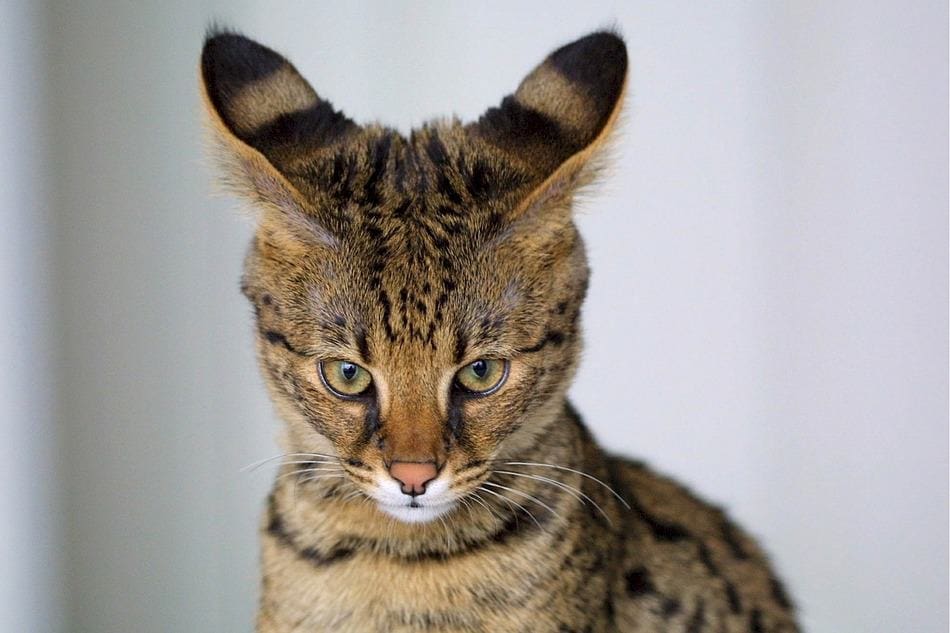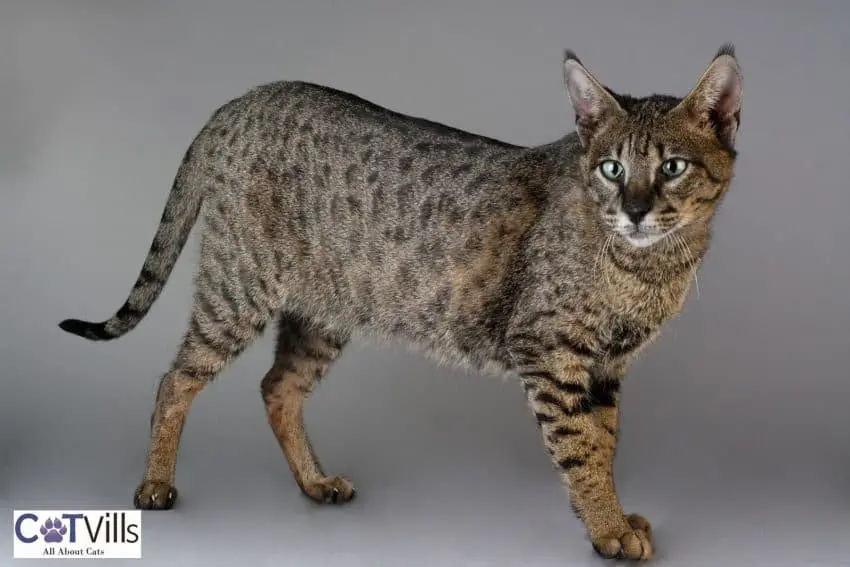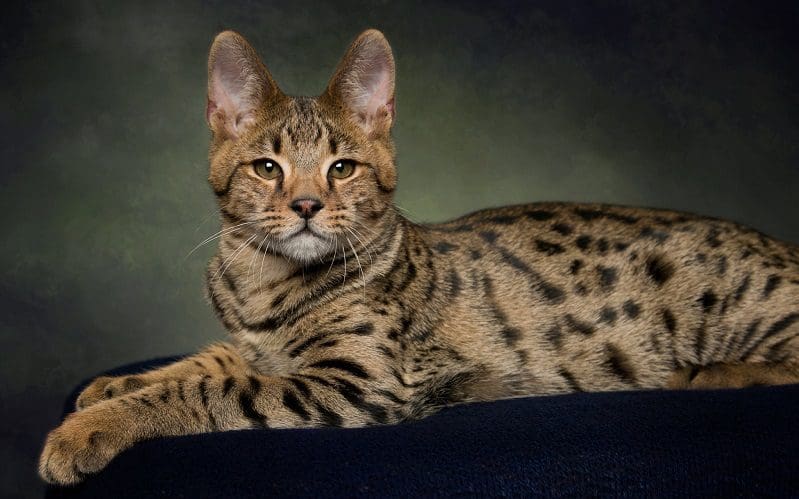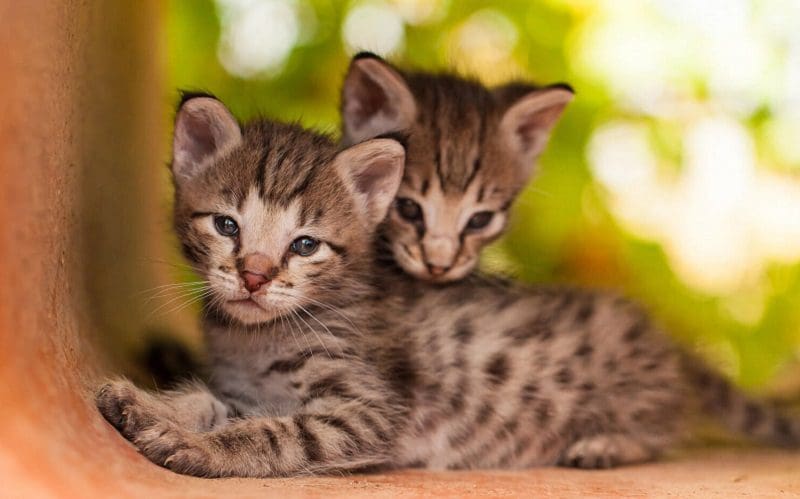Last Updated: 7 months ago
Considering the Savannah cat breed as your next family cat?
This breed is unlike any other and has some things to consider. Learn what you need to know, from traits and health to where you can get a kitty!
The Savannah cat breed brings a touch of the wild into the homes of everyone who pet-parents this remarkable feline.
However, the Savannah isn’t your typical domesticated pet. This unusual kitty has some very unique roots that need to be considered.
Before you bring Savannah home, this post will tell you what you will need and want to know.
History of the Savannah Cat Breed

The date was April 7th, 1986, when the first Savannah kitten was born. Bengal breeder Judee Frank paired her female Seal Point Siamese with a male Serval belonging to Suzy Wood.
Although neither expected the beautiful result, this new breed would go on to gain popularity with cat fanciers all over the world.
The first kitten (F1 or first generation hybrid cross) was christened “Savannah,” to signify the African grasslands that are home to the Serval’s ancestors.
With Savannah, Wood was able to breed the first known F2 (second-generation) Savannah cat.
Because of this animal’s unique qualities, it wasn’t long before an interested buyer, Patrick Kelly, obtained one of the kittens.
But Patrick Kelly didn’t just want a pet; he wanted to produce a new breed of domestic cat and enlisted the aid of cat breeder Joyce Sroufe to assist him.
After much painstaking research and many steps, Kelly and Sroufe were able to produce a new feline breed successfully.
The Savannah got its recognition from The International Cat Association (TICA) as a New Advanced Breed Class in 2001.
Appearance of the Savannah Cat Breed

The exotic appearance of the Savannah is breathtaking.
- This breed sports a spotted coat with bold markings.
- It has a lean, muscular build, and even though it may look large, it is considered a medium-sized feline.
- The remarkable coat of the Savannah can vary in color from brown, tan, or gold with black or dark brown spots to silver with black or dark grey spots, black with black spots, and black-tipped silver with black spots.
Other unique features of the Savannah include its tall ears, hooded eyes (which are flat on top), and long neck, legs, and body.
- Size: From 8 to 30 pounds (nope, that’s not a typo!)
- Lifespan: 12 to 15 years (some have lived to 30)
- Traits: Active, talkative, and intelligent
There is nothing simple or ordinary about this feline!
Personality of the Savannah Cat Breed
Just like Savannah’s bold appearance, its personality is bold and boisterous.
- This breed loves to be active and busy; expect to find him on top of everything, including the refrigerator.
- The Savannah bonds strongly with his family members, so be prepared for a constant companion following you around the home.
- This feline is loyal and loves to chatter up a storm or show his affection through a cat headbutt.
This cat does best with a person or family that will entertain him with tough toys, loving devotion, and maybe even the occasional swim in the bathtub.
That’s right! The Savannah loves the water, so keep those toilet seats down.
When raised and appropriately socialized, the Savannah can enjoy life with other cats, children, and even dogs.
And since the Savannah is highly intelligent, you can easily train him to walk on a leash, do tricks, and fetch.
Health Issues of the Savannah Cat Breed

Although there are no known significant health issues with the Savannah cat breed, they can be susceptible to the same conditions as other domesticated felines.
Savannah pet parents do need to be aware of the types of toys they are allowing their Savannahs to play with, as obstruction due to ingestion has been reported.
Inappropriate toys that are flimsy or easily destroyed are not recommended for this sturdy breed. These include toys that are too small, lightweight, and easily swallowed.
Before your Savannah has any surgery, your veterinarian should establish whether your pet has inherited a smaller than normal liver (this is from the Serval lineage).
If so, ketamine should not be administered, as this drug is metabolized through the liver, which can cause serious health issues.
How to Care for a Savannah Cat
All cats need a high-protein diet; the Savannah is no exception.
- To keep your fur baby healthy, Savannah’s diet should consist of a protein-based diet.
- High-quality, pure proteins found in chicken, beef, duck, and fish are necessary to keep your cat in optimal health.
- Another reason protein is a vital substance for your Savannah is that the breed is prone to having a deficiency in taurine, which is found in meat.
- When searching for dry or wet food for your cat, be sure the first ingredient is a named protein and the food is low in grains, especially corn, wheat, and soy.
- Avoid those foods that use fillers such as by-products and ingredients only identified as “meat.”
Savannah pet parents should be prepared to provide their pet with plenty of mental and physical stimulation.
This breed needs to be challenged and can get destructive and even depressed when not exercised and played with daily.
Be sure to keep your Savannah’s nails trimmed, their coat brushed, and their teeth clean. Although daily oral hygiene is optimal, once a week is better than nothing at all.
Savannahs love to chew electrical cords, houseplants, and anything that tickles their fancy, be sure to secure these objects to ensure your cat is out of danger.
Lastly, even though your Savannah may look like a “wild” cat, keeping her indoors is still the safest choice.
Outdoor felines are put in harm’s way through contact with other animals, traffic, and cruel people who may want to harm or even steal your Savannah.
Savannah Kittens

If you have decided that a Savannah is the right breed for you, then be sure to research a reputable breeder.
- People who refuse to disclose information on the lineage of the kittens or won’t show you the parents are most likely hiding something.
- Kittens should be properly socialized while with their mother.
- When viewing a litter of Savannah kittens, look for ones that are interacting with their surroundings. Timid, fearful, or skittish cats are not what you are looking for in a Savannah.
A Savannah kitten should have bright eyes, a soft, shiny coat, and be well-toned. Skinny kittens or those that have visible ailments (weeping eyes, dirty ears, underweight) should be avoided.
Savannah kittens are very pricey. Depending on the generation you are getting, they can start at around $1,200 all the way up to (and beyond) $5,000!
According to F1’s Hybrid Savannah Cats, sometimes bottle feeding is required in the first generation of kittens.
This is due to the difference in gestation between a domesticated cat and the Serval (a domesticated cat is around 63 days, the African Serval Cat is about 74 days).
Having a ten-day gestational difference can result in some F1 kittens being slightly premature.
Premature kittens require intense specialty care during the first few weeks. This complex process results in higher prices due to the time and skill level involved.
Ask the breeder you are researching if their kittens were born prematurely.
Wrap-Up
The Savannah cat breed brings a touch of the wild into the homes of all those pet parents who are ready to embark on the journey.
Be sure you are prepared to take this feisty and fantastic feline on!
Do you have the Savannah cat breed? Share your thoughts and tips below!
Resources:

